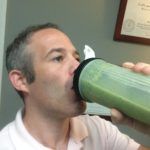The Last Diet You’ll Ever Go On
 “Eat less, move more” is supposed to be the one-size-fits-all prescription for losing excess weight. But our ability to follow the prescription varies greatly as we are seemingly sabotaged by stress in our lives or by simply being too busy, contributing to a yo-yo dieting pattern of weight loss and gain. Can a healthy weight become a long-term habit, despite the challenges we experience over a lifetime? Yes, if we take advantage of two powerful tools: plasticity and precommitment.
“Eat less, move more” is supposed to be the one-size-fits-all prescription for losing excess weight. But our ability to follow the prescription varies greatly as we are seemingly sabotaged by stress in our lives or by simply being too busy, contributing to a yo-yo dieting pattern of weight loss and gain. Can a healthy weight become a long-term habit, despite the challenges we experience over a lifetime? Yes, if we take advantage of two powerful tools: plasticity and precommitment.
Scientific research confirms what many of us already know, that our impulse control, or lack thereof, affects our ability to lose weight and keep it off. How we set ourselves up for failure is to respond, “So all I have to do is control my impulses to overeat.” Not so fast. When that oversimplified approach fails, we beat ourselves up, resulting in even less energy to make good choices next time.
Instead, we need to understand that the degree to which we can exert effort to change behaviors (say, to eat sensible portions instead of overfilling our plates) is governed by the current state of our brains – which is a result of both genetics and the social environments we have lived in. It is also the result of the immediate situations we face. We know that stress seems to lower our self control, but numerous studies have also shown that making decisions – even decisions as seemingly innocuous as completing your wedding registry or ordering a new computer! – lowers one’s impulse control (a.k.a. “willpower,” “self control,” and “the way you stop after one doughnut”). Pretty much anything that requires mental energy is tapping into the same reserves that willpower needs.
In a cruel twist for anyone trying to lose weight, glucose will restore willpower in the moment. When you reach for the brownies after a hard day of work, with a long To Do list still waiting for you at home, you’re not a failure. Your body is doing what it knows to do to make sure you have mental energy.
The good news is that our brains also have an amazing feature called plasticity . Scientists used to think that the brains we were born with were the ones that we had for life. In recent years, however, we’ve learned that’s not true – our brains can grow new neurons! We have the ability to begin to think differently.
The question, then, is how to cultivate higher behavioral impulse control, and the answer is to practice precommitment .
Precommitment is defined by researchers as “the voluntary restriction of access to temptations.” Precommitment means taking steps before an event occurs to ensure that you will stay on track to meet your goals. Images of the brain have shown that precommitment changes the way the brain responds to the need for willpower, increasing its ability to delay gratification, especially in individuals who tend to be more impulsive.
In addition to limiting factors that might derail your weight loss goals, another key component of precommitment is self-care – knowing what you need to feel well and actively incorporating it in your life. This will help keep your emotional and mental bank account full, allowing you to make withdrawals later when you need strength for impulse control.
There are numerous ways to incorporate precommitment.
- When you go to dinner at a restaurant, ask the waiter not to bring out the bread bowl before the meal, so that you won’t have the chance to spend all your calories on carbohydrates and throw off your blood sugar levels.
- If you know you will be hungry waiting for your dinner out or at a party, eat a small snack full of fiber, protein, and fat – nuts are ideal – before you leave home. The snack will keep your blood sugar stable and help prevent you from glutting on calories later on, out of ravenous hunger and lowered self-control.
- Cut up servings of veggies and fruit at the beginning of the week that you can easily grab for lunches and dinners later. If you have older children who can help, make it a family project on Sunday afternoons. (Bonus: hands-on activities are the best ways for kids to learn new skills!) Order pretty, reusable storage packs. In my case, I like to make green smoothies for lunch. They taste good, are quick and are a good way for me to make sure I’ve got a healthy lunch.
- Devise ways around the obstacles that keep you from exercising. Turn off your phone and computer at a set time each night so you get to bed earlier and are able to stop hitting snooze instead of lacing up your sneakers the next morning. Load your iPod with new songs to keep your runs from being boring. Download an app that helps you keep track of your workouts.
- Schedule alone time, especially if you are an introvert. Introverts are re-charged when they have time to themselves. Like time with friends, quiet time is important, not just something that should be tacked onto our lives if we are not too busy. One great way to achieve this quiet time of reflection is to…..
- You don’t have to sit a certain way for an hour and chant Om. You can start with just a few minutes, anywhere you find comfortable. You can even practice walking meditation. Meditation will make you feel better, and it will make those important brain changes mentioned earlier. In a study that took MRIs of people’s brains after meditating, “participant-reported reductions in stress also were correlated with decreased gray-matter density in the amygdala, which is known to play an important role in anxiety and stress.” And of course, there’s an app for that.
- Think about the life you want. A recent study indicated that overweight women are capable of demonstrating greater impulse control if they imagined themselves “in enjoyable future scenarios.”
- Make a chiropractic appointment. Don’t live with energy-taxing pain. Chiropractic care can relieve painful body conditions and prevent them from returning. A chiropractor can also support weight loss by providing diet and activity recommendations and managing any injuries that occur, so you can keep your momentum going.
If you’re like many of us, at least one of the above tips feels like an indictment.
“I could never convince my kids to help with kitchen chores!”
“How am I supposed to find time to meet up with friends? I brush my teeth in the shower and eat standing up!”
Fortunately, making changes isn’t a one-chance deal. Plasticity is achieved over time. If you didn’t reach your goals this week, you have another opportunity to practice pre-commitment by figuring out why it didn’t work and how to make it work next week. You can also change your goals if you continue to miss them, which can be a sign that they aren’t realistic, or at least not realistic for now. Your goal is to cultivate habits you can enjoy over a lifetime.
What many weight loss plans are missing – and what keeps us hopping from one fad diet to another – is that we are not machines, where you plug in a specific formula and an ideal weight pops out. We are humans, with rich lives and living brains, which respond to the choices we make over time.
That’s the secret. That’s the last diet you will ever go on.

RESET. REHAB. PERFORM.
QUICK LINKS
CONTACT
(434) 293-3800
office@balancechiropracticva.com
608 Preston Avenue, Suite 100
Charlottesville, VA 22903








